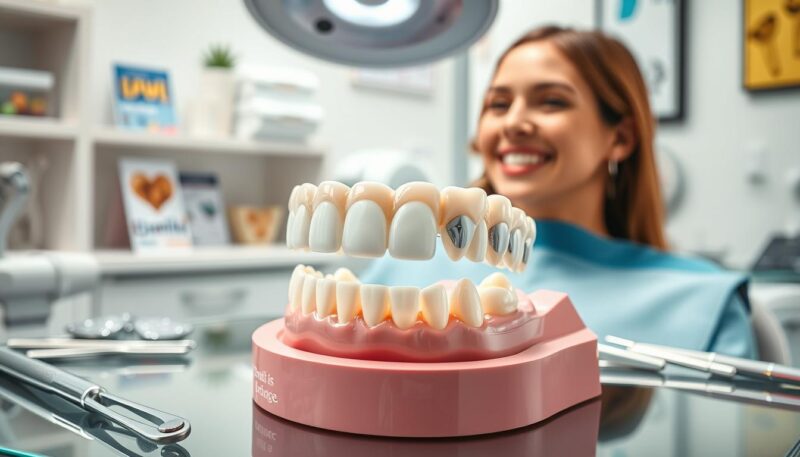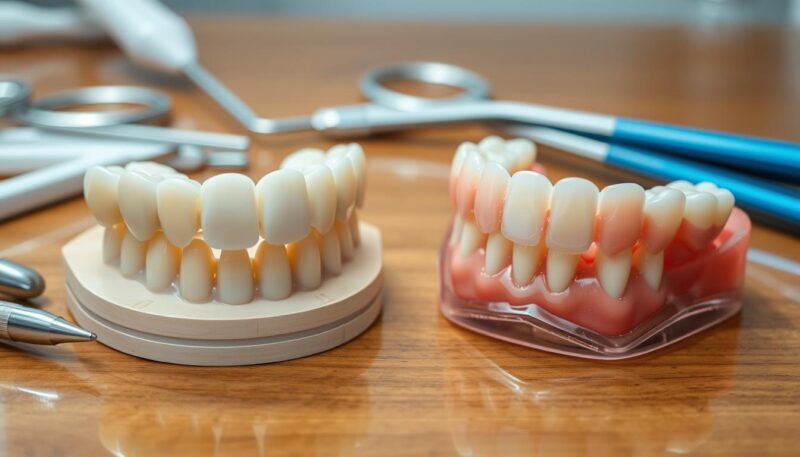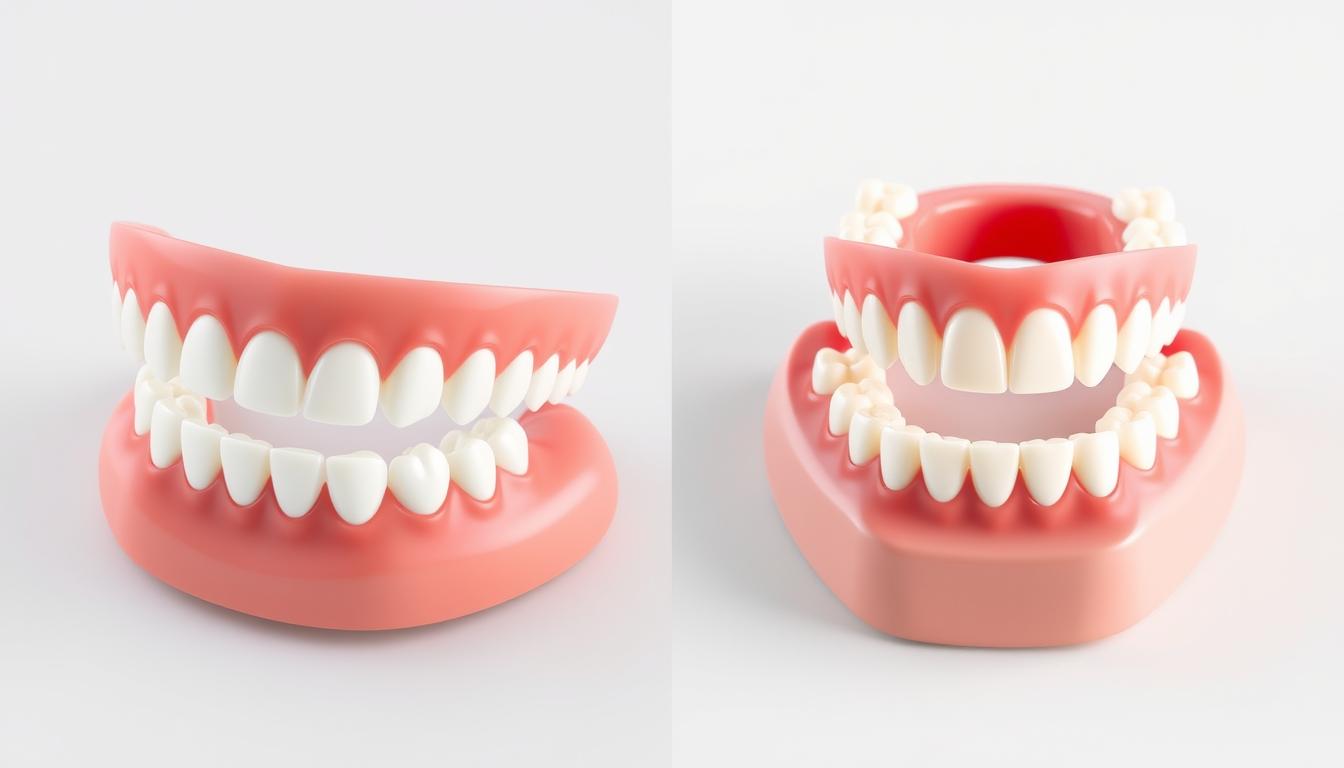When it comes to replacing missing teeth, you have several options to consider, including a dental bridge vs denture. Both dental bridges and dentures offer a range of benefits and can improve the function and appearance of your teeth. A fixed bridge is considered a suitable option for individuals who have lost just a few teeth from one area of the mouth, while a partial denture is recommended for individuals who have lost multiple teeth at various locations throughout a dental arch.
Choosing the right teeth replacement method can be a daunting task, but it’s essential to consider the impact of missing teeth on your oral health, appearance, and overall well-being. The bridge vs denture debate is a common one, and it’s crucial to weigh the pros and cons of each option. In this article, we’ll explore the world of dental bridge vs denture, helping you make an informed decision about which option is best for your unique situation.
Whether you’re considering a dental bridge vs denture, it’s essential to consult with a professional dentist to determine the best course of treatment. With the help of a skilled dentist, you can choose the right teeth replacement method and enjoy a healthy, beautiful smile for years to come. The cost of dentures and dental bridges varies, with the average cost of dentures ranging from $300 to $500 per denture and the average cost of a dental bridge ranging from $2,000 to $5,000.
Understanding Your Tooth Replacement Options
Choosing the right method to replace missing teeth is essential for your oral health and confidence. Two popular options you might consider are dental bridges and dentures. Each has its unique benefits and considerations.
What Are Dental Bridges?
Dental bridges are fixed prosthetic devices anchored to adjacent natural teeth or dental implants. They provide a stable and permanent solution, typically lasting between 10 to 15 years with proper maintenance. Bridges help maintain bone support, reducing the risk of bone loss and gum disease. However, they require healthy teeth to support them and might make oral hygiene more challenging, increasing the risk of decay around the supporting teeth.
What Are Dentures?
Dentures can be full or partial and are removable replacements for missing teeth. They offer flexibility and are often more affordable upfront compared to bridges. With regular care, dentures can provide good jawbone support for 5 to 7 years. They ensure a natural look and can be taken out for cleaning, but over time, they may cause bone deterioration and may not feel as secure as bridges, potentially leading to slipping or clicking.
Key Differences Between Bridges and Dentures
When comparing dentures vs bridges for missing teeth, consider permanence and maintenance. Dental bridges are fixed and require less daily handling but depend on the health of neighboring teeth. Dentures offer removable convenience and affordability but may need adjustments and can affect bone density over time. Understanding the pros and cons of dental bridges and dentures will help you make an informed decision tailored to your lifestyle and oral health needs.
Everything You Need to Know About Dental Bridges
If you’re missing a few teeth, dental bridges might be the solution you need. A dental bridge fills the gap where one or more teeth are missing, restoring your smile and functionality.

The process starts with preparing the adjacent teeth to support the bridge. Your dentist will then take impressions to create custom-made artificial teeth that match your natural ones.
Understanding the benefits of dental bridges can help you make an informed decision. Here are some key advantages:
- Improved appearance by replacing missing teeth
- Enhanced speech and chewing ability
- Prevention of gum disease and bone loss
- Maintains proper bite force distribution
Maintaining your dental bridge is essential for its longevity. Regular brushing, flossing, and dental check-ups help prevent gum disease. Unlike dentures, bridges are fixed in place, requiring less daily maintenance.
| Feature | Dental Bridges | Dentures |
|---|---|---|
| Durability | Last up to 15 years | Need replacement every 5 years |
| Cost | More expensive upfront | Generally more affordable |
| Maintenance | Less maintenance, fixed in place | Requires daily removal and cleaning |
| Aesthetics | Natural-looking results | May appear less natural |
| Bone Support | Prevents bone loss | Can lead to bone loss over time |
When deciding between dentures and bridges, consider factors like durability, maintenance, and appearance. Consulting with your local dentist, such as the Dental Group of Lubbock in Lubbock, TX, can provide personalized advice based on your specific needs.
Bridge vs Denture: Making the Right Choice for Your Smile
Deciding between dentures and bridges involves evaluating your oral health, the number of missing teeth, and your lifestyle needs. Understanding the differences can help you make an informed choice.
Cost Considerations
When how to decide between dentures and bridges, cost plays a significant role. Here’s a quick comparison:
- Dentures: Generally more affordable upfront and suitable for replacing an entire arch of teeth.
- Bridges: Higher initial cost but can last up to 15 years, making them a long-term investment.
Durability and Maintenance
Bridge or denture for tooth replacement depends on how long you want the solution to last. Bridges offer greater durability, lasting up to 15 years with proper care, whereas dentures typically need replacement every 5-7 years. Bridges require less daily maintenance but depend on the strength of neighboring teeth.
Comfort and Functionality
Comfort is crucial for daily use. Dentures need to be removed and soaked overnight, which some find inconvenient. Bridges, being fixed, provide a more natural feeling and ease of eating and speaking without the need for removal.
Aesthetic Results
Both options aim to restore your smile, but bridges often provide a more seamless and natural appearance as they are permanently fixed in place.

Conclusion: Making Your Final Decision
Choosing the right teeth replacement is a personal decision that impacts your daily life and oral health. Both dental bridges and dentures offer unique benefits. Dentures provide flexibility and are a great option if you’ve lost many teeth or have weak remaining teeth. They are also generally more affordable upfront.
On the other hand, dental bridges offer a permanent solution that blends seamlessly with your natural teeth. They are ideal if you have strong adjacent teeth and seek a stable and long-lasting fix. Bridges require regular maintenance to ensure their longevity and prevent decay.
When deciding between the benefits of dentures and bridges, consider factors like durability, comfort, and your budget. Reflect on how each option fits your lifestyle and dental needs. Consulting with a dental professional can guide you in making an informed choice tailored to your situation.
Ultimately, both dentures and bridges can enhance your smile and improve oral function. By weighing the pros and cons of each, you can choose the right teeth replacement that best suits your health and personal preferences.

